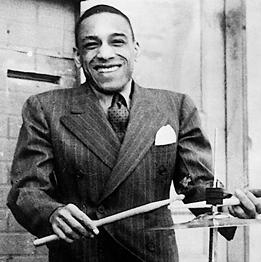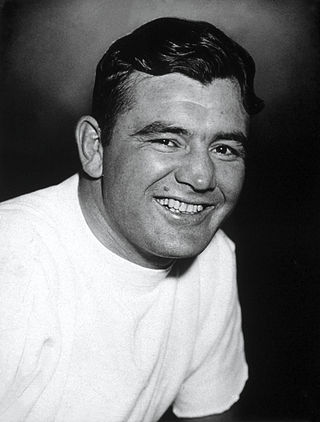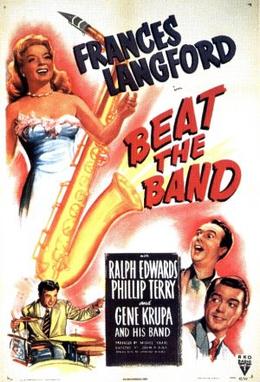Plot
This article needs a plot summary.(December 2023) |
| To Beat the Band | |
|---|---|
| Directed by | Benjamin Stoloff Kenny Holmes (assistant) |
| Screenplay by | Rian James |
| Story by | George Marion, Jr. |
| Produced by | Zion Myers |
| Starring | Hugh Herbert Helen Broderick Roger Pryor Fred Keating |
| Cinematography | Nick Musuraca |
| Edited by | George Crone |
| Music by | Alberto Colombo |
Production company | |
| Distributed by | RKO Pictures |
Release date |
|
Running time | 70 minutes |
| Country | United States |
| Language | English |
To Beat the Band is a 1935 American romantic comedy directed by Benjamin Stoloff using a screenplay by Rian James based on a story by George Marion, Jr. The film stars Hugh Herbert, Helen Broderick, Roger Pryor, and Fred Keating, and features Johnny Mercer in a small role. Baritone Ronald Graham was a featured singer in the film. It was released by RKO Radio Pictures on November 8, 1935.
This article needs a plot summary.(December 2023) |
Beat, beats or beating may refer to:

Michael Trent Reznor is an American musician, singer, songwriter, record producer, and composer. He serves as the lead vocalist, multi-instrumentalist, and principal songwriter of the industrial rock band Nine Inch Nails, which he founded in 1988 and of which he was the sole official member until 2016. The first Nine Inch Nails album, Pretty Hate Machine (1989), was a commercial and critical success. Reznor has since released 11 more Nine Inch Nails studio albums.

The Beat Generation was a literary subculture movement started by a group of authors whose work explored and influenced American culture and politics in the post-World War II era. The bulk of their work was published and popularized by Silent Generationers in the 1950s, better known as Beatniks. The central elements of Beat culture are the rejection of standard narrative values, making a spiritual quest, the exploration of American and Eastern religions, the rejection of economic materialism, explicit portrayals of the human condition, experimentation with psychedelic drugs, and sexual liberation and exploration.

General Public were an English new wave band, formed in Birmingham in 1983, by vocalists Dave Wakeling and Ranking Roger of the Beat, and which also included former members of Dexys Midnight Runners, the Specials, and the Clash. They are best remembered for their hits "Tenderness" (1984) and "I'll Take You There" (1994).
Rendezvous or rendez-vous may refer to:

James Andrew Rushing was an American singer and pianist from Oklahoma City, Oklahoma, U.S., best known as the featured vocalist of Count Basie's Orchestra from 1935 to 1948.

James Melvin Lunceford was an American jazz alto saxophonist and bandleader in the swing era.

William Henry "Chick" Webb was an American jazz and swing music drummer and band leader.
A heartbeat is one cardiac cycle of the heart.
Rhumba, also known as ballroom rumba, is a genre of ballroom music and dance that appeared in the East Coast of the United States during the 1930s. It combined American big band music with Afro-Cuban rhythms, primarily the son cubano, but also conga and rumba. Although taking its name from the latter, ballroom rumba differs completely from Cuban rumba in both its music and its dance. Hence, authors prefer the Americanized spelling of the word (rhumba) to distinguish between them.
Wax Trax! Records is an American independent record label based in Chicago. It began as a record shop in Denver, Colorado, opened by life partners Jim Nash and Dannie Flesher, who sold the store in 1978 and moved to Chicago. In November of that year, they opened a store under the same name in the Lincoln Park neighborhood. During the 1980s and 1990s, the accompanying record label became a strong presence on the industrial music scene as well as the punk rock scene in Chicago, and an outlet for European bands. The label was purchased by TVT Records in 1992 and was discontinued in 2001. In 2014, it was re-established by Julia Nash, daughter of co-founder Jim Nash.

James Walter Braddock was an American boxer who was the world heavyweight champion from 1935 to 1937.
A cowboy is a professional pastoralist or mounted livestock herder, usually from the Americas or Australia.

Benjamin Stoloff was an American film director and producer. He began his career as a director of short films, and he moved into directing and producig feature films.

Balkan brass, popularly known by the Serbian name Truba, is a distinctive style of music originating in the Balkan region as a fusion between military music and folk music. In recent years, it has become popular in a techno-synth fusion throughout Europe, and in pop music in the Anglo-American sphere and throughout the world. Songs like Worth It by Fifth Harmony and Talk Dirty by Jason Derulo have brought the style to a new audience. In traditional form, it is popular throughout the Balkans, especially in Serbia, North Macedonia, Bulgaria, Moldova, and Romania, although the turbo-folk variety attracts larger audiences. The energetic and fast beats encourage dance and are egalitarian, often resulting in participation by the entire audience; this unpretentious relationship with audiences, highly charged energy and loud and joyful performances by highly skilled musicians has contributed to its successes. Fans of bands inspired by Balkan bands, such as Gogol Bordello, often state that it is a type of music better experienced than listened to.

"Beat It" is a song by American singer Michael Jackson from his sixth studio album, Thriller (1982). It was written and composed by Jackson and produced by Quincy Jones and co-produced by Jackson. Jones encouraged Jackson to include a rock song on the album. Jackson later said: "I wanted to write a song, the type of song that I would buy if I were to buy a rock song... and I wanted the children to really enjoy it—the school children as well as the college students." It includes a guitar solo by Eddie Van Halen.

The Fresh Beat Band is an American live-action musical children's television series created by Scott Kraft and Nadine van der Velde for Nickelodeon. The show stars the "Fresh Beats", described as four best friends in a band who are determined to follow their dreams. The series aired from August 24, 2009 to December 7, 2013.

Beat the Band is a 1947 American musical film directed by John H. Auer and written by Lawrence Kimble, Clarence Kimble and Arthur A. Ross. The film stars Frances Langford, Ralph Edwards, Phillip Terry, Gene Krupa and June Clayworth. The film was released on February 19, 1947, by RKO Pictures.

Roger Pryor was an American film actor.

Trolls is an American animated media franchise created by DreamWorks Animation, inspired by the successful line of Troll doll toys created by Thomas Dam. The franchise consists of three feature films, Trolls, released in 2016, Trolls World Tour, released in 2020, and Trolls Band Together, released in 2023. The franchise has been supplemented by two holiday television specials titled Trolls Holiday and Trolls: Holiday in Harmony, and two animated series: Trolls: The Beat Goes On! on Netflix, and Trolls: TrollsTopia on Hulu and Peacock.